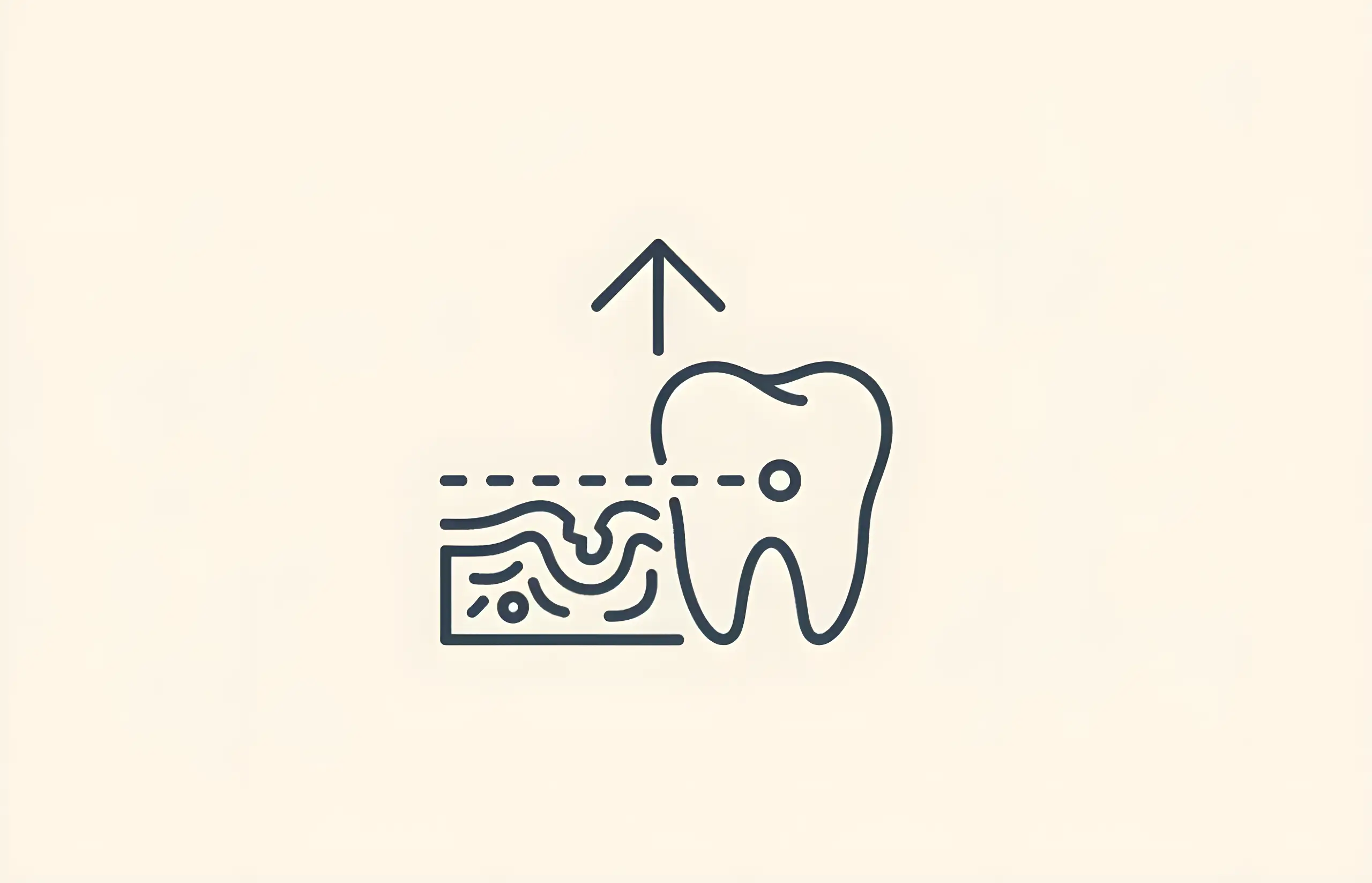Dental implants are the best way to replace missing teeth. Unlike dentures or bridges, implants are permanent fixtures that look and feel like natural teeth. Research demonstrates exceptional longevity with 96.4% survival at 10 years and 78-92% survival at 20 years, making them a sound long-term investment despite higher upfront costs.
However, the cost of dental implants can seem quite expensive when compared with alternative treatments such as dentures or bridges, and many people can be put off by the price. The truth is that dental implants offer excellent value for money over their lifetime, particularly when you consider their durability and the fact that they help preserve your jawbone.
Here we'll provide a comprehensive guide to the costs involved with dental implants in the UK, from single tooth replacement to full mouth dental implants.
What Are Dental Implants?
Dental implants are artificial tooth roots, usually made from titanium, that are surgically placed into your jawbone. Once the implant has integrated with the bone (a process called osseointegration that takes 3-6 months), a connector piece called an abutment is attached, and finally a crown, bridge, or denture is secured on top.
This creates a permanent tooth replacement that functions just like your natural teeth. Unlike bridges, implants don't require grinding down adjacent healthy teeth, and unlike dentures, they're fixed in place and help preserve jawbone density.
How Much Does a Single Tooth Implant Cost?
The cost of a single dental implant in the UK typically ranges from £700 to £2,500, with most treatments falling in the £1,500-£2,000 range. This price usually includes:
- The implant post (titanium screw placed in jawbone)
- The abutment (connector piece)
- The crown (visible tooth replacement)
- Initial consultation and X-rays
- Surgical placement procedure
- Follow-up appointments
Research shows that a single implant with a 10-year survival rate of 96.4% offers excellent value compared to bridges or dentures that may need replacement every 5-10 years.
Factors Affecting Single Implant Costs
Geographic Location: London and major cities charge £2,000-£2,500 for a single implant, while regional areas may offer treatments for £700-£1,500.
Dentist Experience and Qualifications: Specialist oral surgeons and periodontists typically charge more than general dentists, but may offer superior outcomes for complex cases.
Implant Brand: Premium brands like Nobel Biocare, Straumann, or Astra Tech cost more than budget options, but often have more extensive research supporting their long-term success.
Complexity: Straightforward cases in healthy bone cost less. Cases requiring bone grafting, sinus lifts, or treatment of gum disease increase costs significantly.
Type of Crown: All-ceramic crowns (more aesthetic) cost more than porcelain-fused-to-metal crowns.
Additional Procedures and Costs
Many patients require additional procedures before implant placement, which increase total costs:
Bone Grafting: £200-£1,000 per site. Required when insufficient bone exists to support the implant. Research shows that implants placed with bone grafts can achieve similar success rates to implants in native bone.
Sinus Lift: £1,000-£2,500. Required for upper back teeth when the sinus cavity is too close to the jawbone.
Tooth Extraction: £75-£300. Necessary if the damaged tooth hasn't been removed yet. Some dentists offer immediate implant placement after extraction.
CT Scan: £75-£300. Provides detailed 3D imaging for precise implant planning, particularly important for complex cases.
Temporary Crown: £100-£300. Worn during the 3-6 month healing period while the implant integrates with bone.
Full Mouth Dental Implants Cost
Full mouth dental implants are significantly more expensive than single tooth replacement, but modern techniques like All-on-4 and All-on-6 have made full arch restoration more accessible.
All-on-4 Dental Implants
Cost: £8,000-£15,000 per arch (upper or lower jaw)
All-on-4 uses four strategically placed implants to support a full arch of fixed teeth. The back implants are angled to avoid sinus cavities and maximize use of available bone, often eliminating the need for bone grafting.
Benefits include:
- Lower cost than individual implants for each tooth
- Often completed in one day (same-day teeth possible)
- Fewer implants means lower surgical risk
- Good outcomes for patients with some bone loss
Research from a 22-year study of over 10,000 implants demonstrates that full arch restorations on multiple implants achieve 94% survival at 15 years when properly maintained.
All-on-6 Dental Implants
Cost: £10,000-£18,000 per arch
All-on-6 uses six implants per arch, providing additional support and potentially better long-term outcomes, particularly for patients with higher biting forces or less ideal bone quality.
The additional implants provide:
- More stability and support
- Better distribution of chewing forces
- Potentially longer lifespan
- Better option for patients who grind their teeth
Full Arch with Individual Implants
Cost: £15,000-£30,000+ per arch
For patients wanting individual implants for each tooth (typically 6-8 implants per arch with individual crowns or small bridges), costs are considerably higher but offer the most natural result and easiest long-term maintenance.
Both Upper and Lower Arches
Total Cost: £16,000-£60,000+
Replacing all teeth in both jaws (full mouth) varies widely based on technique:
- All-on-4 for both arches: £16,000-£30,000
- All-on-6 for both arches: £20,000-£36,000
- Individual implant approach: £30,000-£60,000+
While these costs seem substantial, research shows that 78-92% of implants survive 20 years, potentially providing decades of function compared to dentures requiring regular replacement.
Implant-Supported Dentures
For patients who cannot afford or don't want fixed teeth, implant-supported dentures offer a middle-ground solution:
Snap-on Dentures: £3,000-£8,000 per arch
- 2-4 implants with removable denture that clicks onto attachments
- More stable than traditional dentures
- More affordable than fixed teeth
- Can eat more comfortably than regular dentures
Bar-Retained Dentures: £8,000-£15,000 per arch
- 4-6 implants connected with metal bar
- Very stable removable denture
- Easier to clean than fixed options
Hybrid Dentures: £10,000-£20,000 per arch
- Fixed (non-removable) denture on 4-6 implants
- More affordable than individual crowns
- Strong and durable
Are Dental Implants Available on the NHS?
Dental implants are rarely available on the NHS and only provided in exceptional circumstances, such as:
- Severe trauma affecting facial appearance or function
- Congenital conditions affecting jaw development
- Cancer treatment requiring jaw reconstruction
The vast majority of patients must pursue private treatment. NHS dental treatment bands don't typically cover implant procedures.
Financing Options for Dental Implants
Given the significant costs involved, most dental practices offer various payment options:
Monthly Payment Plans: Many clinics offer in-house financing with 0% interest if paid within 6-12 months, or extended payment plans at low interest rates.
Dental Payment Plans: Services like Denplan allow spreading costs over monthly payments while also covering routine dental care.
Healthcare Credit Companies: Companies like Tabeo or Payl8r offer medical financing specifically for dental procedures, sometimes with 0% interest periods.
Dental Insurance: Most policies exclude implants or have lengthy waiting periods and annual caps. Check your policy carefully before assuming coverage.
Medical Tourism: Some patients travel abroad for treatment at 40-60% lower costs. However, this requires careful consideration of follow-up care, quality standards, and complications that may arise after returning home.
Do Dental Implants Last?
Research provides compelling evidence for implant longevity:
10-Year Survival: 96.4% for traditional loading protocols and 93.2% in sensitivity analysis across diverse patient populations and implant systems.
15-Year Survival: 94% at the implant level, demonstrating sustained success beyond the first decade.
20-Year Survival: 78-92% survival, meaning approximately 4 out of 5 implants survive two decades with proper care.
A comprehensive study following 10,871 dental implants in 4,247 patients over up to 22 years found that cumulative survival rates remain excellent when implants are properly maintained and patients attend regular check-ups.
Factors Affecting Implant Success
While survival rates are high, certain factors influence long-term outcomes:
Peri-implantitis: The primary threat to implant longevity is peri-implantitis—inflammation and bone loss around the implant similar to gum disease. Research shows prevalence of:
- 19.53% at patient level (nearly 1 in 5 patients experience this)
- 12.53% at implant level (affecting roughly 1 in 8 implants)
Smoking: Significantly reduces implant success rates and increases peri-implantitis risk. Many dentists recommend smoking cessation before implant placement.
Diabetes: Uncontrolled diabetes increases failure rates. Well-controlled diabetes has minimal impact on success.
Oral Hygiene: Excellent home care and regular professional cleanings are critical for preventing peri-implantitis and ensuring long-term success.
Bone Quality: Adequate bone density and quality improve osseointegration and long-term stability.
Implant Loading Protocol: Traditional delayed loading (waiting 3-6 months after placement) shows slightly better survival (96.4%) compared to immediate loading (93.2%), though both are highly successful.
Are Dental Implants Worth the Investment?
Despite high upfront costs, dental implants offer excellent value when considering:
Longevity: With 96.4% 10-year survival and 78-92% 20-year survival, implants often last decades—far longer than bridges (10-15 years) or dentures (5-10 years).
Bone Preservation: Implants stimulate jawbone like natural tooth roots, preventing the bone loss that occurs with dentures and causes facial aging.
No Damage to Adjacent Teeth: Unlike bridges that require grinding down healthy adjacent teeth, implants stand independently.
Function and Comfort: Implants function like natural teeth with no dietary restrictions, unlike dentures which limit food choices and may slip or cause sore spots.
Quality of Life: Research consistently shows improved confidence, social function, and overall satisfaction compared to removable dentures.
Cost Per Year: A £2,000 implant lasting 20 years costs £100 per year. A £500 bridge lasting 10 years costs £50 per year, but requires replacing twice in the same period (£100 per year) plus potential damage to supporting teeth.
Choosing Your Implant Treatment
When considering dental implants, prioritize:
Dentist Qualifications: Choose a dentist or specialist with extensive implant training and experience. Ask about their success rates and complication management.
Treatment Planning: Comprehensive examination with CT scans ensures proper planning and reduces complications.
Implant Brand: Research-supported brands with long-term data (like those referenced in the studies above) offer greater confidence in outcomes.
Realistic Expectations: Understand that treatment takes 3-6 months minimum, requires excellent oral hygiene, and success depends partly on your commitment to maintenance.
Long-Term Care: Budget for regular check-ups and professional cleanings (typically £50-£100 every 6 months) essential for preventing peri-implantitis.
Conclusion
Dental implants represent a significant financial investment, with single teeth costing £700-£2,500 and full mouth treatments ranging from £8,000-£21,000. However, research demonstrates that this investment delivers exceptional long-term value with 96.4% of implants surviving 10 years and 78-92% surviving 20 years.
The key to successful outcomes is proper case selection, experienced surgical placement, high-quality components, and—most importantly—excellent long-term maintenance to prevent peri-implantitis, which affects approximately 1 in 5 patients.
While the upfront costs may seem daunting, financing options make treatment accessible, and the long-term benefits in terms of function, aesthetics, bone preservation, and quality of life make dental implants the gold standard for tooth replacement.
Consult with a qualified implant dentist to discuss your specific situation, understand realistic expectations, and determine whether dental implants are the right choice for your needs and budget.
Sources and References
-
[1]
How far can we go? A 20-year meta-analysis of dental implant survival ratesClinical Oral Investigationshttps://pubmed.ncbi.nlm.nih.gov/39340553/
-
[2]
Long-term (10-year) dental implant survival: A systematic review and sensitivity meta-analysisJournal of Dentistryhttps://pubmed.ncbi.nlm.nih.gov/31036467/
-
[3]
Long term clinical performance of 10 871 dental implants with up to 22 years of follow‐up: A cohort study in 4247 patientsClinical Implant Dentistry and Related Researchhttps://pubmed.ncbi.nlm.nih.gov/33655583/
-
[4]
What is the prevalence of peri-implantitis? A systematic review and meta-analysisBMC Oral Healthhttps://pubmed.ncbi.nlm.nih.gov/36514016/
All sources accessed and verified on . Medical information reviewed for accuracy and compliance with current guidelines.
Related Articles

Can You Have Dental Implants With Gum Disease?
Complete guide to dental implants and gum disease including symptoms of periodontitis, success rates with treated gum disease, and treatment requirements before implant surgery

Full Mouth Dental Implants – Costs and Information
A comprehensive guide to full mouth dental implant rehabilitation, including procedures, healing times, success rates, and UK costs

Can You Get Snap On Teeth You Can Eat With?
Complete guide to snap-on teeth including what they are, how they work, eating with them, care instructions, and alternatives for permanent solutions
About The Dental Guide
The Dental Guide is a trusted online resource providing evidence-based information about dental health, treatments, and procedures. Our content is created and reviewed by qualified dental professionals to help you make informed decisions about your oral health.
Our Mission
- Evidence-based dental information
- Expert-reviewed content
- Clear, accessible explanations
- Latest treatment options
- Patient-focused guidance
Editorial Standards
- GDC-registered dental professionals
- Peer-reviewed sources
- Regular content updates
- Medical accuracy verification
- Transparent authorship
Important Notice
The information on The Dental Guide is for educational purposes only and should not replace professional dental advice. Always consult with a qualified dentist for diagnosis and treatment recommendations tailored to your individual needs and circumstances.
Medically Reviewed
Reviewed by Dr. Nasim Mechoui , BDS (Bristol)
Share this article
Comments & Discussion
Have questions about dental implants? Share your thoughts or experiences.
